Healthcare Professionalism: A Gibbs Model Reflective Analysis Report
VerifiedAdded on 2023/06/18
|11
|3930
|385
Report
AI Summary
This report examines the concept of professionalism in healthcare, focusing on speech and language therapy, through the lens of the Gibbs Reflective Cycle. It analyzes a critical incident involving a group presentation disrupted by technical issues. The report details the six stages of the Gibbs model—description, feelings, evaluation, analysis, conclusion, and action plan—to reflect on the experience. It covers the students' initial distress, the lecturer's supportive response, and the importance of remaining calm under pressure. The analysis highlights the value of deep breathing techniques for stress management and the potential for such situations to lead to depression if not handled properly, emphasizing the crucial role of supportive educators. The report concludes with an action plan for future similar situations, focusing on preparedness, communication, and emotional regulation.

Health and social care
Paraphrase This Document
Need a fresh take? Get an instant paraphrase of this document with our AI Paraphraser
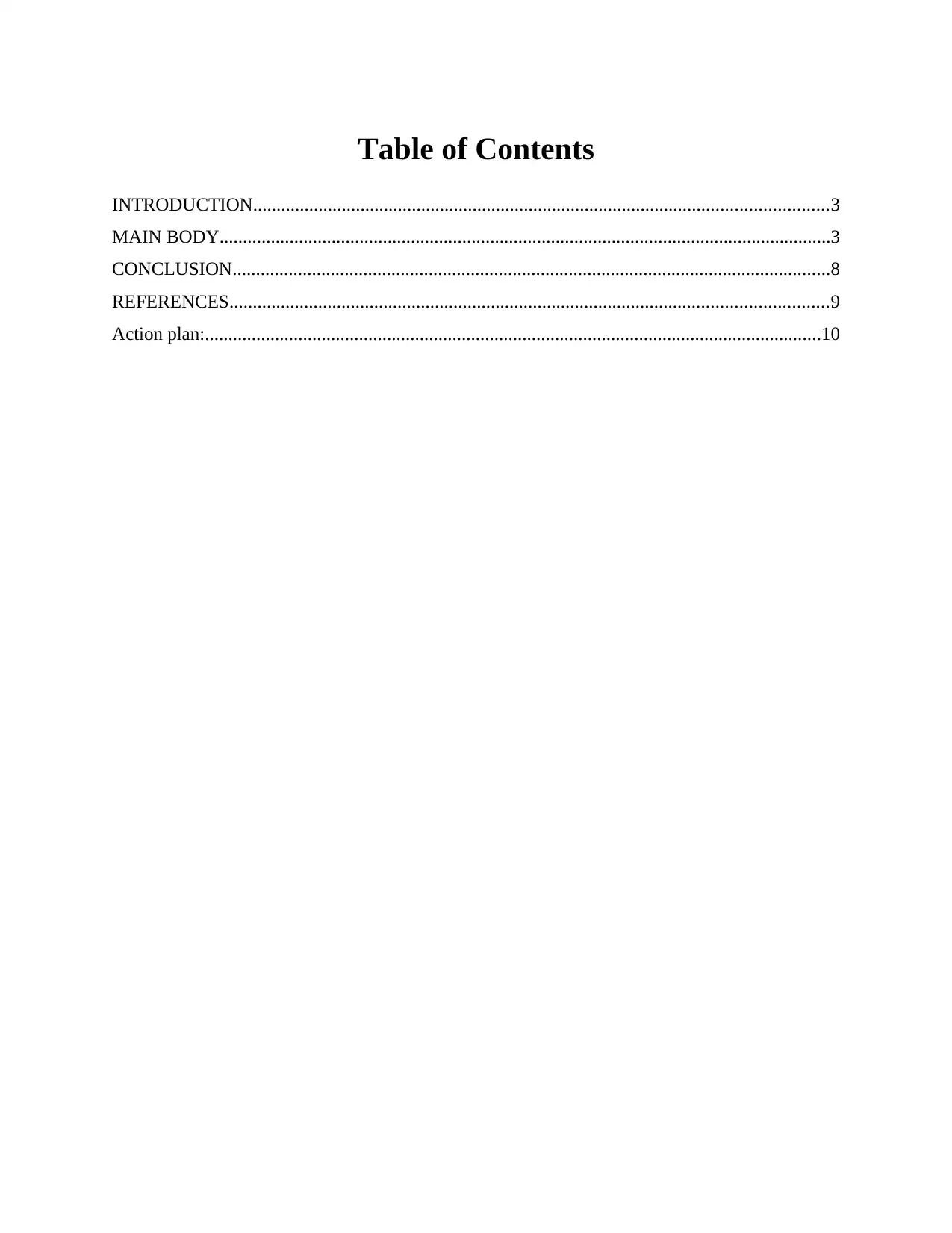
Table of Contents
INTRODUCTION...........................................................................................................................3
MAIN BODY...................................................................................................................................3
CONCLUSION................................................................................................................................8
REFERENCES................................................................................................................................9
Action plan:....................................................................................................................................10
INTRODUCTION...........................................................................................................................3
MAIN BODY...................................................................................................................................3
CONCLUSION................................................................................................................................8
REFERENCES................................................................................................................................9
Action plan:....................................................................................................................................10
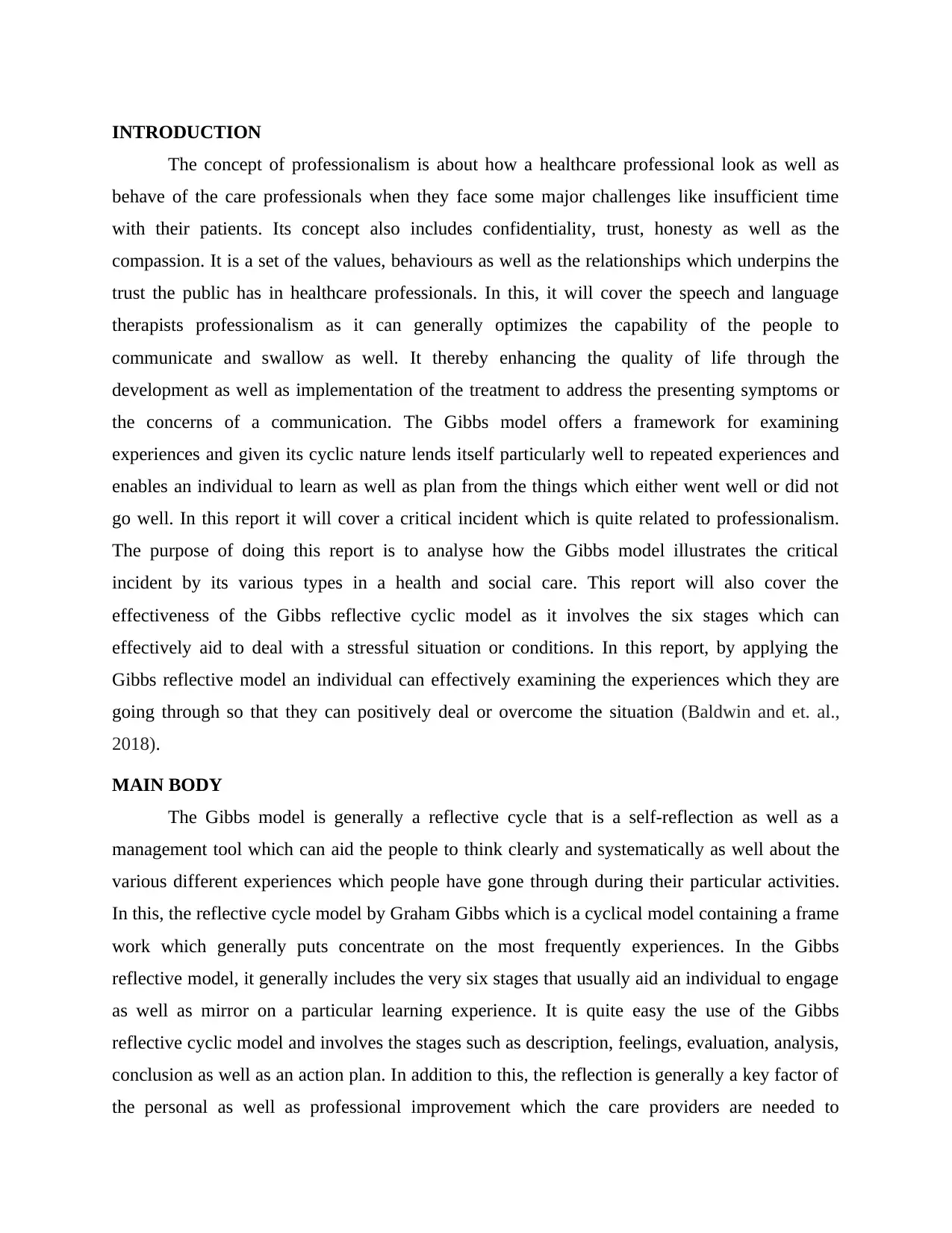
INTRODUCTION
The concept of professionalism is about how a healthcare professional look as well as
behave of the care professionals when they face some major challenges like insufficient time
with their patients. Its concept also includes confidentiality, trust, honesty as well as the
compassion. It is a set of the values, behaviours as well as the relationships which underpins the
trust the public has in healthcare professionals. In this, it will cover the speech and language
therapists professionalism as it can generally optimizes the capability of the people to
communicate and swallow as well. It thereby enhancing the quality of life through the
development as well as implementation of the treatment to address the presenting symptoms or
the concerns of a communication. The Gibbs model offers a framework for examining
experiences and given its cyclic nature lends itself particularly well to repeated experiences and
enables an individual to learn as well as plan from the things which either went well or did not
go well. In this report it will cover a critical incident which is quite related to professionalism.
The purpose of doing this report is to analyse how the Gibbs model illustrates the critical
incident by its various types in a health and social care. This report will also cover the
effectiveness of the Gibbs reflective cyclic model as it involves the six stages which can
effectively aid to deal with a stressful situation or conditions. In this report, by applying the
Gibbs reflective model an individual can effectively examining the experiences which they are
going through so that they can positively deal or overcome the situation (Baldwin and et. al.,
2018).
MAIN BODY
The Gibbs model is generally a reflective cycle that is a self-reflection as well as a
management tool which can aid the people to think clearly and systematically as well about the
various different experiences which people have gone through during their particular activities.
In this, the reflective cycle model by Graham Gibbs which is a cyclical model containing a frame
work which generally puts concentrate on the most frequently experiences. In the Gibbs
reflective model, it generally includes the very six stages that usually aid an individual to engage
as well as mirror on a particular learning experience. It is quite easy the use of the Gibbs
reflective cyclic model and involves the stages such as description, feelings, evaluation, analysis,
conclusion as well as an action plan. In addition to this, the reflection is generally a key factor of
the personal as well as professional improvement which the care providers are needed to
The concept of professionalism is about how a healthcare professional look as well as
behave of the care professionals when they face some major challenges like insufficient time
with their patients. Its concept also includes confidentiality, trust, honesty as well as the
compassion. It is a set of the values, behaviours as well as the relationships which underpins the
trust the public has in healthcare professionals. In this, it will cover the speech and language
therapists professionalism as it can generally optimizes the capability of the people to
communicate and swallow as well. It thereby enhancing the quality of life through the
development as well as implementation of the treatment to address the presenting symptoms or
the concerns of a communication. The Gibbs model offers a framework for examining
experiences and given its cyclic nature lends itself particularly well to repeated experiences and
enables an individual to learn as well as plan from the things which either went well or did not
go well. In this report it will cover a critical incident which is quite related to professionalism.
The purpose of doing this report is to analyse how the Gibbs model illustrates the critical
incident by its various types in a health and social care. This report will also cover the
effectiveness of the Gibbs reflective cyclic model as it involves the six stages which can
effectively aid to deal with a stressful situation or conditions. In this report, by applying the
Gibbs reflective model an individual can effectively examining the experiences which they are
going through so that they can positively deal or overcome the situation (Baldwin and et. al.,
2018).
MAIN BODY
The Gibbs model is generally a reflective cycle that is a self-reflection as well as a
management tool which can aid the people to think clearly and systematically as well about the
various different experiences which people have gone through during their particular activities.
In this, the reflective cycle model by Graham Gibbs which is a cyclical model containing a frame
work which generally puts concentrate on the most frequently experiences. In the Gibbs
reflective model, it generally includes the very six stages that usually aid an individual to engage
as well as mirror on a particular learning experience. It is quite easy the use of the Gibbs
reflective cyclic model and involves the stages such as description, feelings, evaluation, analysis,
conclusion as well as an action plan. In addition to this, the reflection is generally a key factor of
the personal as well as professional improvement which the care providers are needed to
⊘ This is a preview!⊘
Do you want full access?
Subscribe today to unlock all pages.

Trusted by 1+ million students worldwide
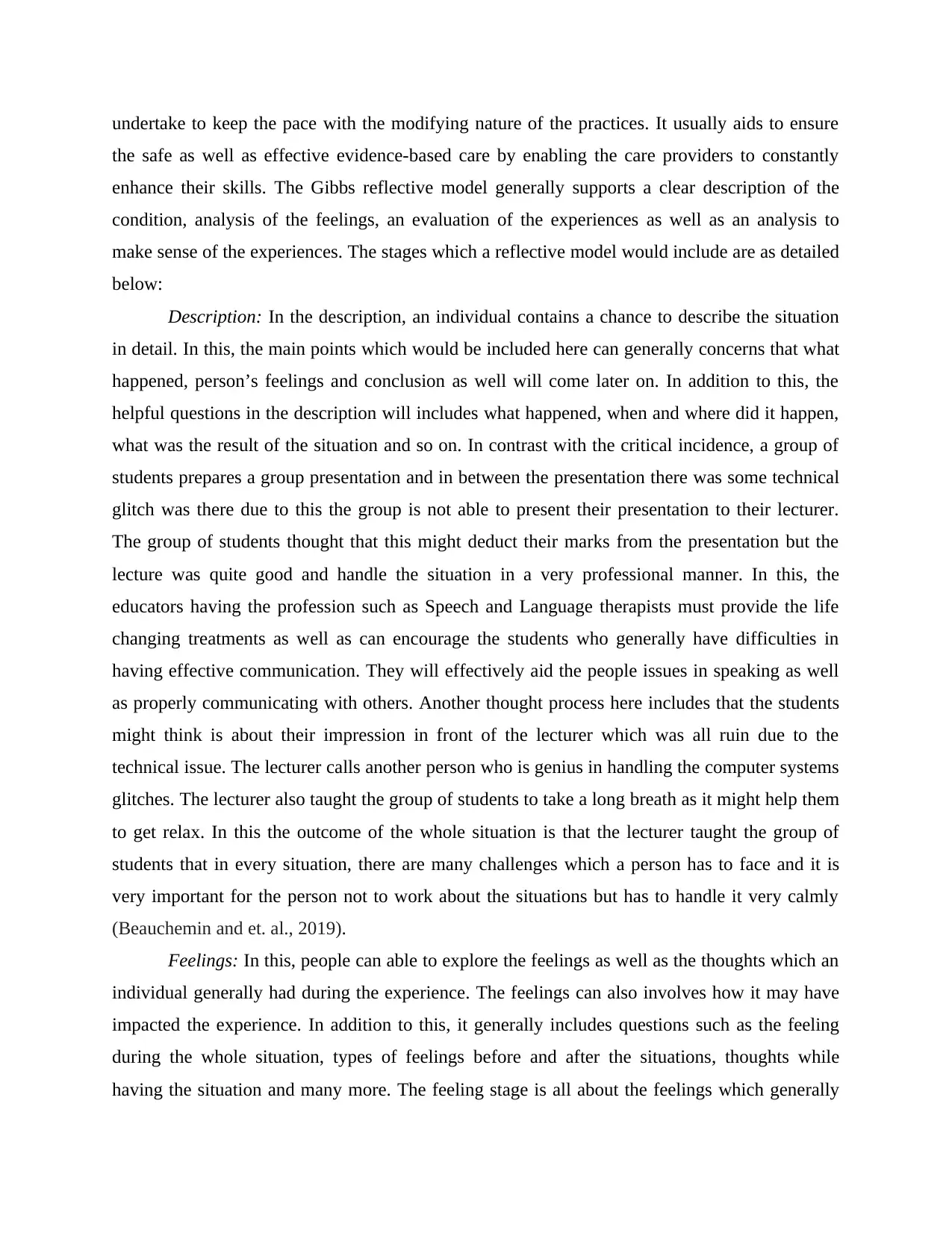
undertake to keep the pace with the modifying nature of the practices. It usually aids to ensure
the safe as well as effective evidence-based care by enabling the care providers to constantly
enhance their skills. The Gibbs reflective model generally supports a clear description of the
condition, analysis of the feelings, an evaluation of the experiences as well as an analysis to
make sense of the experiences. The stages which a reflective model would include are as detailed
below:
Description: In the description, an individual contains a chance to describe the situation
in detail. In this, the main points which would be included here can generally concerns that what
happened, person’s feelings and conclusion as well will come later on. In addition to this, the
helpful questions in the description will includes what happened, when and where did it happen,
what was the result of the situation and so on. In contrast with the critical incidence, a group of
students prepares a group presentation and in between the presentation there was some technical
glitch was there due to this the group is not able to present their presentation to their lecturer.
The group of students thought that this might deduct their marks from the presentation but the
lecture was quite good and handle the situation in a very professional manner. In this, the
educators having the profession such as Speech and Language therapists must provide the life
changing treatments as well as can encourage the students who generally have difficulties in
having effective communication. They will effectively aid the people issues in speaking as well
as properly communicating with others. Another thought process here includes that the students
might think is about their impression in front of the lecturer which was all ruin due to the
technical issue. The lecturer calls another person who is genius in handling the computer systems
glitches. The lecturer also taught the group of students to take a long breath as it might help them
to get relax. In this the outcome of the whole situation is that the lecturer taught the group of
students that in every situation, there are many challenges which a person has to face and it is
very important for the person not to work about the situations but has to handle it very calmly
(Beauchemin and et. al., 2019).
Feelings: In this, people can able to explore the feelings as well as the thoughts which an
individual generally had during the experience. The feelings can also involves how it may have
impacted the experience. In addition to this, it generally includes questions such as the feeling
during the whole situation, types of feelings before and after the situations, thoughts while
having the situation and many more. The feeling stage is all about the feelings which generally
the safe as well as effective evidence-based care by enabling the care providers to constantly
enhance their skills. The Gibbs reflective model generally supports a clear description of the
condition, analysis of the feelings, an evaluation of the experiences as well as an analysis to
make sense of the experiences. The stages which a reflective model would include are as detailed
below:
Description: In the description, an individual contains a chance to describe the situation
in detail. In this, the main points which would be included here can generally concerns that what
happened, person’s feelings and conclusion as well will come later on. In addition to this, the
helpful questions in the description will includes what happened, when and where did it happen,
what was the result of the situation and so on. In contrast with the critical incidence, a group of
students prepares a group presentation and in between the presentation there was some technical
glitch was there due to this the group is not able to present their presentation to their lecturer.
The group of students thought that this might deduct their marks from the presentation but the
lecture was quite good and handle the situation in a very professional manner. In this, the
educators having the profession such as Speech and Language therapists must provide the life
changing treatments as well as can encourage the students who generally have difficulties in
having effective communication. They will effectively aid the people issues in speaking as well
as properly communicating with others. Another thought process here includes that the students
might think is about their impression in front of the lecturer which was all ruin due to the
technical issue. The lecturer calls another person who is genius in handling the computer systems
glitches. The lecturer also taught the group of students to take a long breath as it might help them
to get relax. In this the outcome of the whole situation is that the lecturer taught the group of
students that in every situation, there are many challenges which a person has to face and it is
very important for the person not to work about the situations but has to handle it very calmly
(Beauchemin and et. al., 2019).
Feelings: In this, people can able to explore the feelings as well as the thoughts which an
individual generally had during the experience. The feelings can also involves how it may have
impacted the experience. In addition to this, it generally includes questions such as the feeling
during the whole situation, types of feelings before and after the situations, thoughts while
having the situation and many more. The feeling stage is all about the feelings which generally
Paraphrase This Document
Need a fresh take? Get an instant paraphrase of this document with our AI Paraphraser
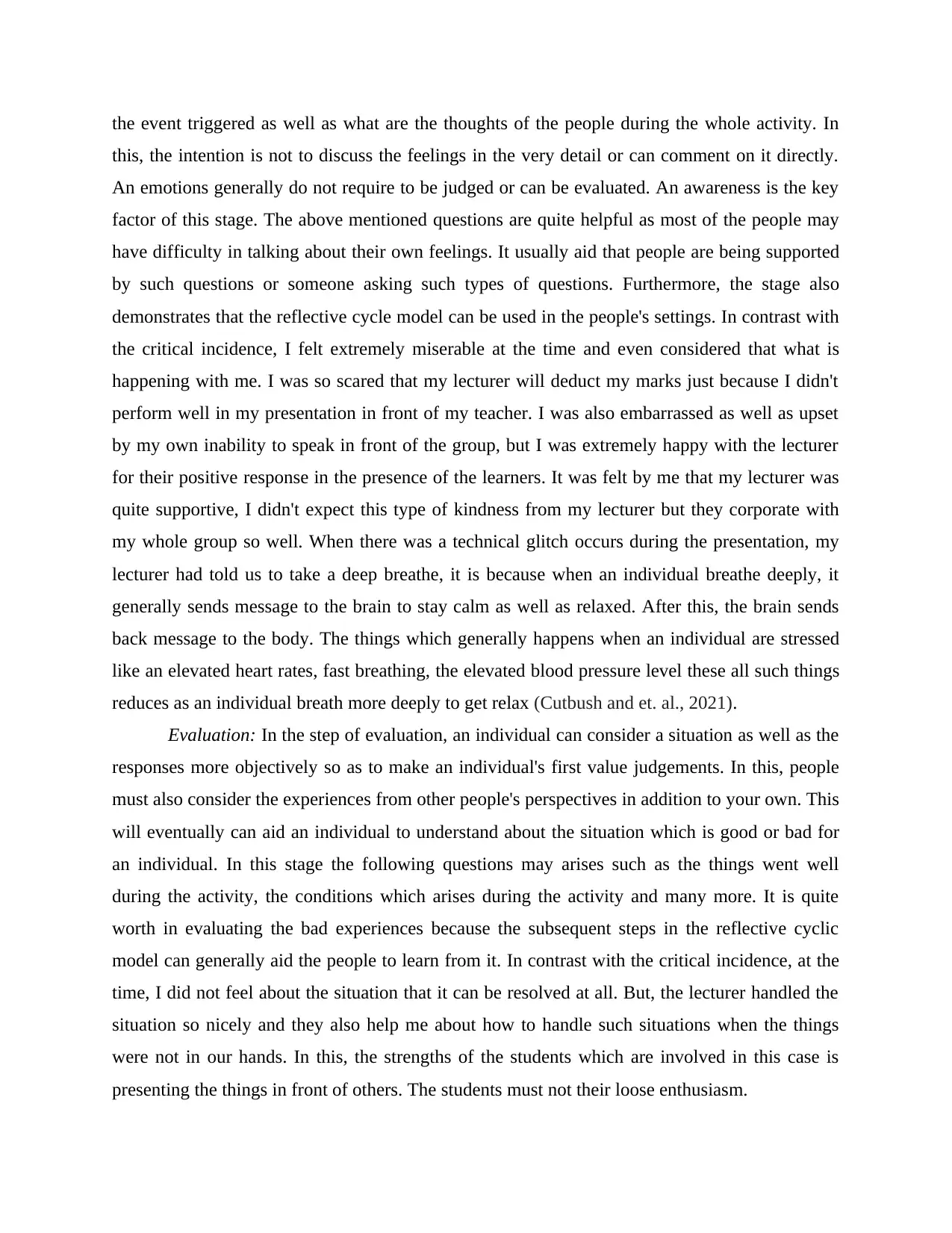
the event triggered as well as what are the thoughts of the people during the whole activity. In
this, the intention is not to discuss the feelings in the very detail or can comment on it directly.
An emotions generally do not require to be judged or can be evaluated. An awareness is the key
factor of this stage. The above mentioned questions are quite helpful as most of the people may
have difficulty in talking about their own feelings. It usually aid that people are being supported
by such questions or someone asking such types of questions. Furthermore, the stage also
demonstrates that the reflective cycle model can be used in the people's settings. In contrast with
the critical incidence, I felt extremely miserable at the time and even considered that what is
happening with me. I was so scared that my lecturer will deduct my marks just because I didn't
perform well in my presentation in front of my teacher. I was also embarrassed as well as upset
by my own inability to speak in front of the group, but I was extremely happy with the lecturer
for their positive response in the presence of the learners. It was felt by me that my lecturer was
quite supportive, I didn't expect this type of kindness from my lecturer but they corporate with
my whole group so well. When there was a technical glitch occurs during the presentation, my
lecturer had told us to take a deep breathe, it is because when an individual breathe deeply, it
generally sends message to the brain to stay calm as well as relaxed. After this, the brain sends
back message to the body. The things which generally happens when an individual are stressed
like an elevated heart rates, fast breathing, the elevated blood pressure level these all such things
reduces as an individual breath more deeply to get relax (Cutbush and et. al., 2021).
Evaluation: In the step of evaluation, an individual can consider a situation as well as the
responses more objectively so as to make an individual's first value judgements. In this, people
must also consider the experiences from other people's perspectives in addition to your own. This
will eventually can aid an individual to understand about the situation which is good or bad for
an individual. In this stage the following questions may arises such as the things went well
during the activity, the conditions which arises during the activity and many more. It is quite
worth in evaluating the bad experiences because the subsequent steps in the reflective cyclic
model can generally aid the people to learn from it. In contrast with the critical incidence, at the
time, I did not feel about the situation that it can be resolved at all. But, the lecturer handled the
situation so nicely and they also help me about how to handle such situations when the things
were not in our hands. In this, the strengths of the students which are involved in this case is
presenting the things in front of others. The students must not their loose enthusiasm.
this, the intention is not to discuss the feelings in the very detail or can comment on it directly.
An emotions generally do not require to be judged or can be evaluated. An awareness is the key
factor of this stage. The above mentioned questions are quite helpful as most of the people may
have difficulty in talking about their own feelings. It usually aid that people are being supported
by such questions or someone asking such types of questions. Furthermore, the stage also
demonstrates that the reflective cycle model can be used in the people's settings. In contrast with
the critical incidence, I felt extremely miserable at the time and even considered that what is
happening with me. I was so scared that my lecturer will deduct my marks just because I didn't
perform well in my presentation in front of my teacher. I was also embarrassed as well as upset
by my own inability to speak in front of the group, but I was extremely happy with the lecturer
for their positive response in the presence of the learners. It was felt by me that my lecturer was
quite supportive, I didn't expect this type of kindness from my lecturer but they corporate with
my whole group so well. When there was a technical glitch occurs during the presentation, my
lecturer had told us to take a deep breathe, it is because when an individual breathe deeply, it
generally sends message to the brain to stay calm as well as relaxed. After this, the brain sends
back message to the body. The things which generally happens when an individual are stressed
like an elevated heart rates, fast breathing, the elevated blood pressure level these all such things
reduces as an individual breath more deeply to get relax (Cutbush and et. al., 2021).
Evaluation: In the step of evaluation, an individual can consider a situation as well as the
responses more objectively so as to make an individual's first value judgements. In this, people
must also consider the experiences from other people's perspectives in addition to your own. This
will eventually can aid an individual to understand about the situation which is good or bad for
an individual. In this stage the following questions may arises such as the things went well
during the activity, the conditions which arises during the activity and many more. It is quite
worth in evaluating the bad experiences because the subsequent steps in the reflective cyclic
model can generally aid the people to learn from it. In contrast with the critical incidence, at the
time, I did not feel about the situation that it can be resolved at all. But, the lecturer handled the
situation so nicely and they also help me about how to handle such situations when the things
were not in our hands. In this, the strengths of the students which are involved in this case is
presenting the things in front of others. The students must not their loose enthusiasm.
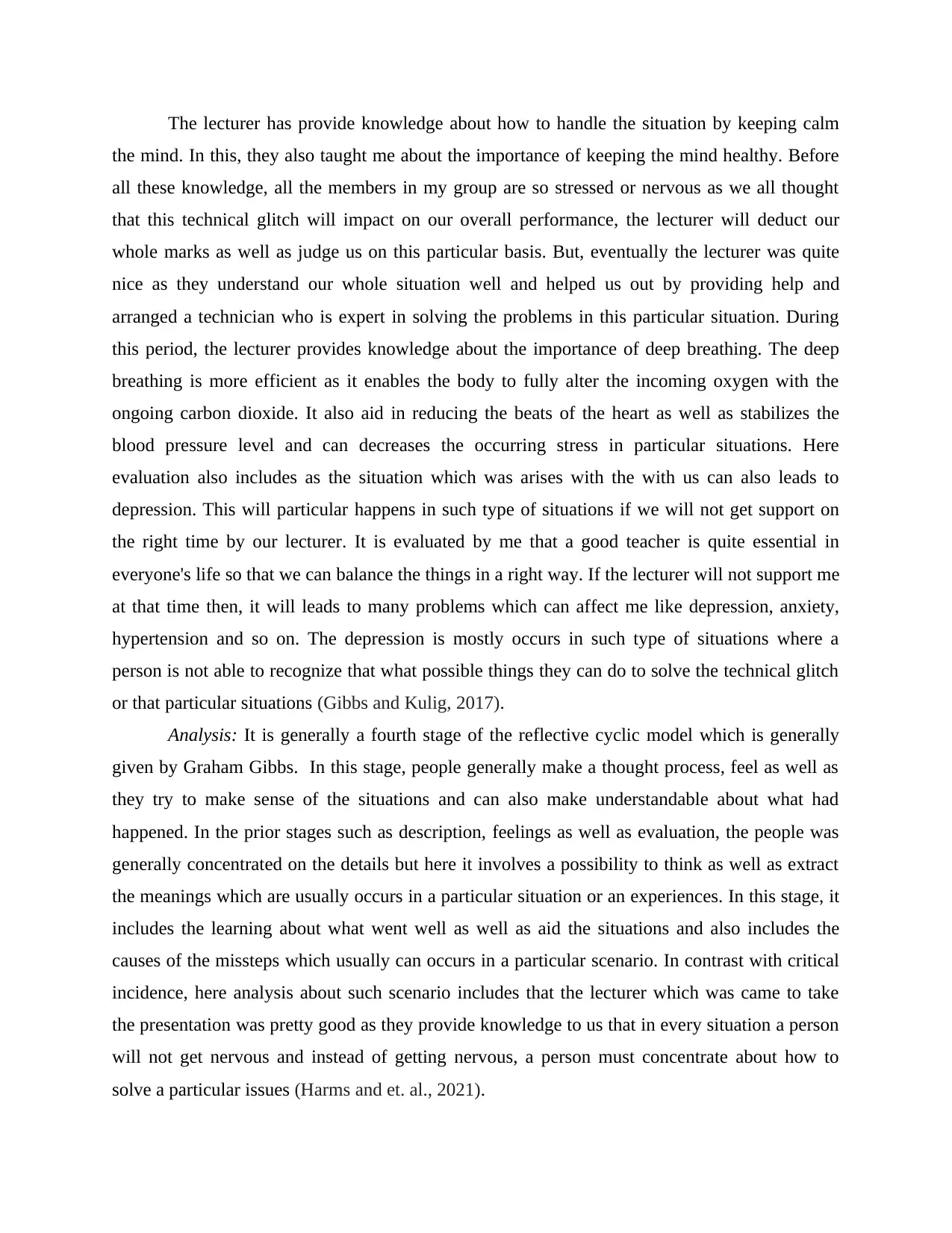
The lecturer has provide knowledge about how to handle the situation by keeping calm
the mind. In this, they also taught me about the importance of keeping the mind healthy. Before
all these knowledge, all the members in my group are so stressed or nervous as we all thought
that this technical glitch will impact on our overall performance, the lecturer will deduct our
whole marks as well as judge us on this particular basis. But, eventually the lecturer was quite
nice as they understand our whole situation well and helped us out by providing help and
arranged a technician who is expert in solving the problems in this particular situation. During
this period, the lecturer provides knowledge about the importance of deep breathing. The deep
breathing is more efficient as it enables the body to fully alter the incoming oxygen with the
ongoing carbon dioxide. It also aid in reducing the beats of the heart as well as stabilizes the
blood pressure level and can decreases the occurring stress in particular situations. Here
evaluation also includes as the situation which was arises with the with us can also leads to
depression. This will particular happens in such type of situations if we will not get support on
the right time by our lecturer. It is evaluated by me that a good teacher is quite essential in
everyone's life so that we can balance the things in a right way. If the lecturer will not support me
at that time then, it will leads to many problems which can affect me like depression, anxiety,
hypertension and so on. The depression is mostly occurs in such type of situations where a
person is not able to recognize that what possible things they can do to solve the technical glitch
or that particular situations (Gibbs and Kulig, 2017).
Analysis: It is generally a fourth stage of the reflective cyclic model which is generally
given by Graham Gibbs. In this stage, people generally make a thought process, feel as well as
they try to make sense of the situations and can also make understandable about what had
happened. In the prior stages such as description, feelings as well as evaluation, the people was
generally concentrated on the details but here it involves a possibility to think as well as extract
the meanings which are usually occurs in a particular situation or an experiences. In this stage, it
includes the learning about what went well as well as aid the situations and also includes the
causes of the missteps which usually can occurs in a particular scenario. In contrast with critical
incidence, here analysis about such scenario includes that the lecturer which was came to take
the presentation was pretty good as they provide knowledge to us that in every situation a person
will not get nervous and instead of getting nervous, a person must concentrate about how to
solve a particular issues (Harms and et. al., 2021).
the mind. In this, they also taught me about the importance of keeping the mind healthy. Before
all these knowledge, all the members in my group are so stressed or nervous as we all thought
that this technical glitch will impact on our overall performance, the lecturer will deduct our
whole marks as well as judge us on this particular basis. But, eventually the lecturer was quite
nice as they understand our whole situation well and helped us out by providing help and
arranged a technician who is expert in solving the problems in this particular situation. During
this period, the lecturer provides knowledge about the importance of deep breathing. The deep
breathing is more efficient as it enables the body to fully alter the incoming oxygen with the
ongoing carbon dioxide. It also aid in reducing the beats of the heart as well as stabilizes the
blood pressure level and can decreases the occurring stress in particular situations. Here
evaluation also includes as the situation which was arises with the with us can also leads to
depression. This will particular happens in such type of situations if we will not get support on
the right time by our lecturer. It is evaluated by me that a good teacher is quite essential in
everyone's life so that we can balance the things in a right way. If the lecturer will not support me
at that time then, it will leads to many problems which can affect me like depression, anxiety,
hypertension and so on. The depression is mostly occurs in such type of situations where a
person is not able to recognize that what possible things they can do to solve the technical glitch
or that particular situations (Gibbs and Kulig, 2017).
Analysis: It is generally a fourth stage of the reflective cyclic model which is generally
given by Graham Gibbs. In this stage, people generally make a thought process, feel as well as
they try to make sense of the situations and can also make understandable about what had
happened. In the prior stages such as description, feelings as well as evaluation, the people was
generally concentrated on the details but here it involves a possibility to think as well as extract
the meanings which are usually occurs in a particular situation or an experiences. In this stage, it
includes the learning about what went well as well as aid the situations and also includes the
causes of the missteps which usually can occurs in a particular scenario. In contrast with critical
incidence, here analysis about such scenario includes that the lecturer which was came to take
the presentation was pretty good as they provide knowledge to us that in every situation a person
will not get nervous and instead of getting nervous, a person must concentrate about how to
solve a particular issues (Harms and et. al., 2021).
⊘ This is a preview!⊘
Do you want full access?
Subscribe today to unlock all pages.

Trusted by 1+ million students worldwide
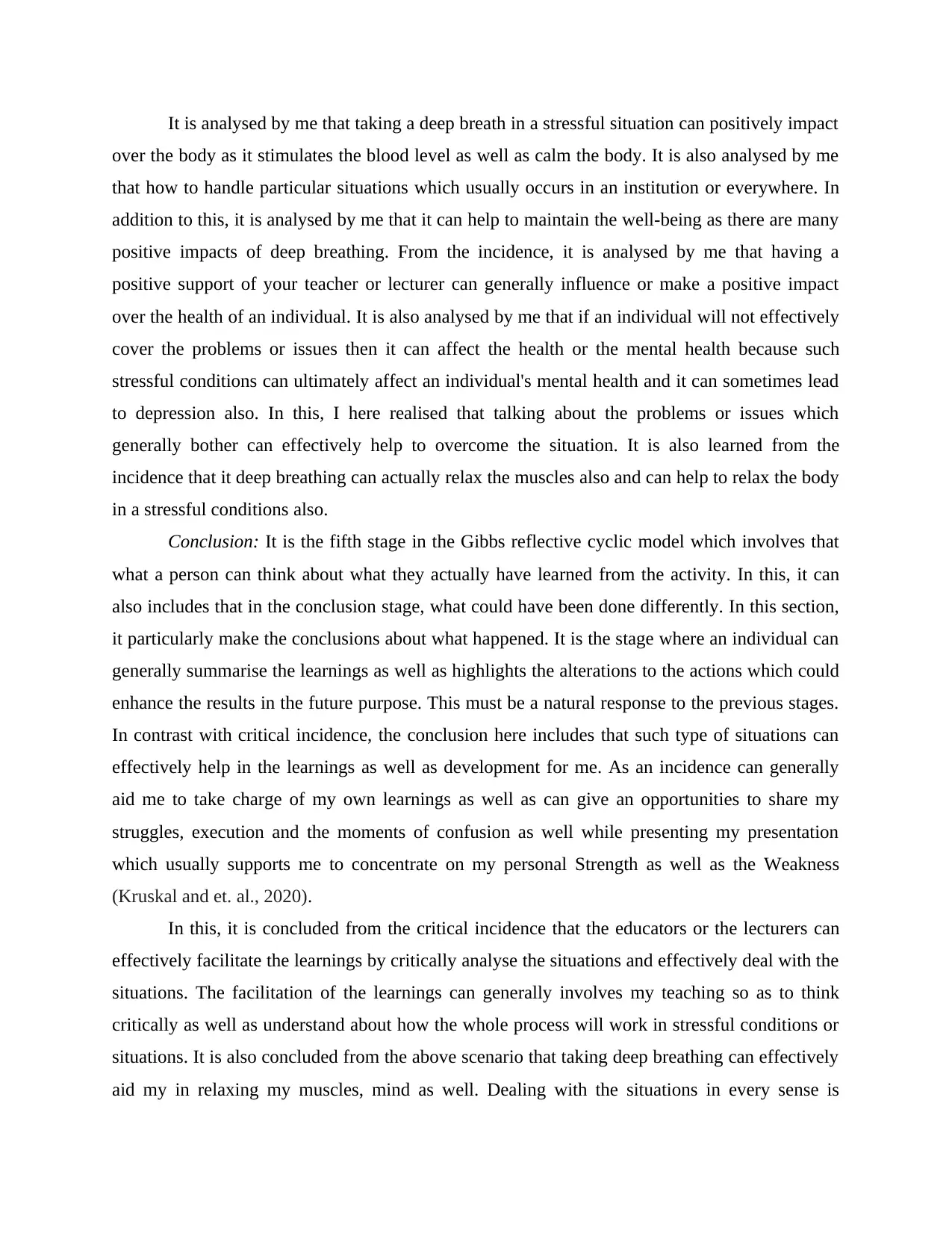
It is analysed by me that taking a deep breath in a stressful situation can positively impact
over the body as it stimulates the blood level as well as calm the body. It is also analysed by me
that how to handle particular situations which usually occurs in an institution or everywhere. In
addition to this, it is analysed by me that it can help to maintain the well-being as there are many
positive impacts of deep breathing. From the incidence, it is analysed by me that having a
positive support of your teacher or lecturer can generally influence or make a positive impact
over the health of an individual. It is also analysed by me that if an individual will not effectively
cover the problems or issues then it can affect the health or the mental health because such
stressful conditions can ultimately affect an individual's mental health and it can sometimes lead
to depression also. In this, I here realised that talking about the problems or issues which
generally bother can effectively help to overcome the situation. It is also learned from the
incidence that it deep breathing can actually relax the muscles also and can help to relax the body
in a stressful conditions also.
Conclusion: It is the fifth stage in the Gibbs reflective cyclic model which involves that
what a person can think about what they actually have learned from the activity. In this, it can
also includes that in the conclusion stage, what could have been done differently. In this section,
it particularly make the conclusions about what happened. It is the stage where an individual can
generally summarise the learnings as well as highlights the alterations to the actions which could
enhance the results in the future purpose. This must be a natural response to the previous stages.
In contrast with critical incidence, the conclusion here includes that such type of situations can
effectively help in the learnings as well as development for me. As an incidence can generally
aid me to take charge of my own learnings as well as can give an opportunities to share my
struggles, execution and the moments of confusion as well while presenting my presentation
which usually supports me to concentrate on my personal Strength as well as the Weakness
(Kruskal and et. al., 2020).
In this, it is concluded from the critical incidence that the educators or the lecturers can
effectively facilitate the learnings by critically analyse the situations and effectively deal with the
situations. The facilitation of the learnings can generally involves my teaching so as to think
critically as well as understand about how the whole process will work in stressful conditions or
situations. It is also concluded from the above scenario that taking deep breathing can effectively
aid my in relaxing my muscles, mind as well. Dealing with the situations in every sense is
over the body as it stimulates the blood level as well as calm the body. It is also analysed by me
that how to handle particular situations which usually occurs in an institution or everywhere. In
addition to this, it is analysed by me that it can help to maintain the well-being as there are many
positive impacts of deep breathing. From the incidence, it is analysed by me that having a
positive support of your teacher or lecturer can generally influence or make a positive impact
over the health of an individual. It is also analysed by me that if an individual will not effectively
cover the problems or issues then it can affect the health or the mental health because such
stressful conditions can ultimately affect an individual's mental health and it can sometimes lead
to depression also. In this, I here realised that talking about the problems or issues which
generally bother can effectively help to overcome the situation. It is also learned from the
incidence that it deep breathing can actually relax the muscles also and can help to relax the body
in a stressful conditions also.
Conclusion: It is the fifth stage in the Gibbs reflective cyclic model which involves that
what a person can think about what they actually have learned from the activity. In this, it can
also includes that in the conclusion stage, what could have been done differently. In this section,
it particularly make the conclusions about what happened. It is the stage where an individual can
generally summarise the learnings as well as highlights the alterations to the actions which could
enhance the results in the future purpose. This must be a natural response to the previous stages.
In contrast with critical incidence, the conclusion here includes that such type of situations can
effectively help in the learnings as well as development for me. As an incidence can generally
aid me to take charge of my own learnings as well as can give an opportunities to share my
struggles, execution and the moments of confusion as well while presenting my presentation
which usually supports me to concentrate on my personal Strength as well as the Weakness
(Kruskal and et. al., 2020).
In this, it is concluded from the critical incidence that the educators or the lecturers can
effectively facilitate the learnings by critically analyse the situations and effectively deal with the
situations. The facilitation of the learnings can generally involves my teaching so as to think
critically as well as understand about how the whole process will work in stressful conditions or
situations. It is also concluded from the above scenario that taking deep breathing can effectively
aid my in relaxing my muscles, mind as well. Dealing with the situations in every sense is
Paraphrase This Document
Need a fresh take? Get an instant paraphrase of this document with our AI Paraphraser
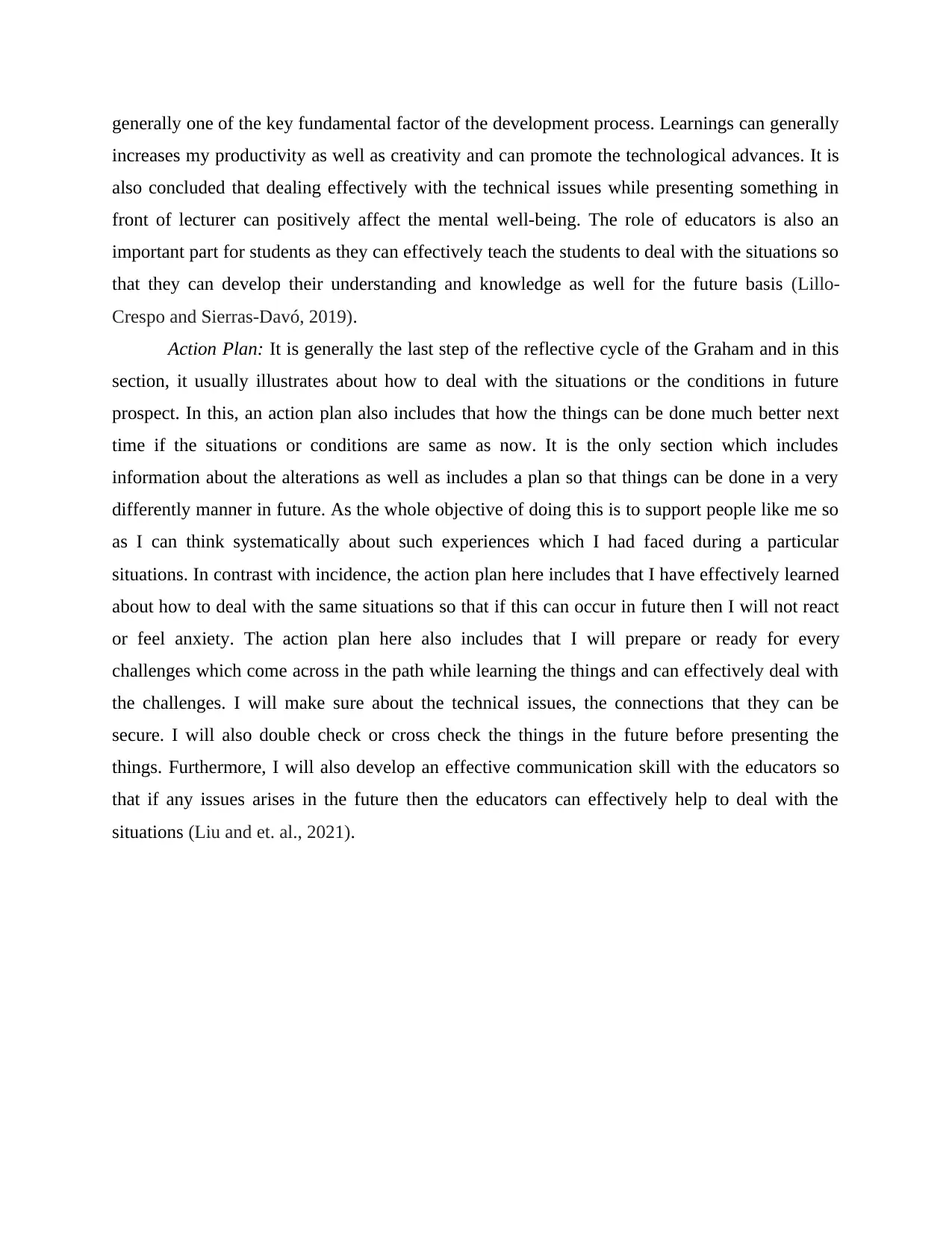
generally one of the key fundamental factor of the development process. Learnings can generally
increases my productivity as well as creativity and can promote the technological advances. It is
also concluded that dealing effectively with the technical issues while presenting something in
front of lecturer can positively affect the mental well-being. The role of educators is also an
important part for students as they can effectively teach the students to deal with the situations so
that they can develop their understanding and knowledge as well for the future basis (Lillo-
Crespo and Sierras-Davó, 2019).
Action Plan: It is generally the last step of the reflective cycle of the Graham and in this
section, it usually illustrates about how to deal with the situations or the conditions in future
prospect. In this, an action plan also includes that how the things can be done much better next
time if the situations or conditions are same as now. It is the only section which includes
information about the alterations as well as includes a plan so that things can be done in a very
differently manner in future. As the whole objective of doing this is to support people like me so
as I can think systematically about such experiences which I had faced during a particular
situations. In contrast with incidence, the action plan here includes that I have effectively learned
about how to deal with the same situations so that if this can occur in future then I will not react
or feel anxiety. The action plan here also includes that I will prepare or ready for every
challenges which come across in the path while learning the things and can effectively deal with
the challenges. I will make sure about the technical issues, the connections that they can be
secure. I will also double check or cross check the things in the future before presenting the
things. Furthermore, I will also develop an effective communication skill with the educators so
that if any issues arises in the future then the educators can effectively help to deal with the
situations (Liu and et. al., 2021).
increases my productivity as well as creativity and can promote the technological advances. It is
also concluded that dealing effectively with the technical issues while presenting something in
front of lecturer can positively affect the mental well-being. The role of educators is also an
important part for students as they can effectively teach the students to deal with the situations so
that they can develop their understanding and knowledge as well for the future basis (Lillo-
Crespo and Sierras-Davó, 2019).
Action Plan: It is generally the last step of the reflective cycle of the Graham and in this
section, it usually illustrates about how to deal with the situations or the conditions in future
prospect. In this, an action plan also includes that how the things can be done much better next
time if the situations or conditions are same as now. It is the only section which includes
information about the alterations as well as includes a plan so that things can be done in a very
differently manner in future. As the whole objective of doing this is to support people like me so
as I can think systematically about such experiences which I had faced during a particular
situations. In contrast with incidence, the action plan here includes that I have effectively learned
about how to deal with the same situations so that if this can occur in future then I will not react
or feel anxiety. The action plan here also includes that I will prepare or ready for every
challenges which come across in the path while learning the things and can effectively deal with
the challenges. I will make sure about the technical issues, the connections that they can be
secure. I will also double check or cross check the things in the future before presenting the
things. Furthermore, I will also develop an effective communication skill with the educators so
that if any issues arises in the future then the educators can effectively help to deal with the
situations (Liu and et. al., 2021).
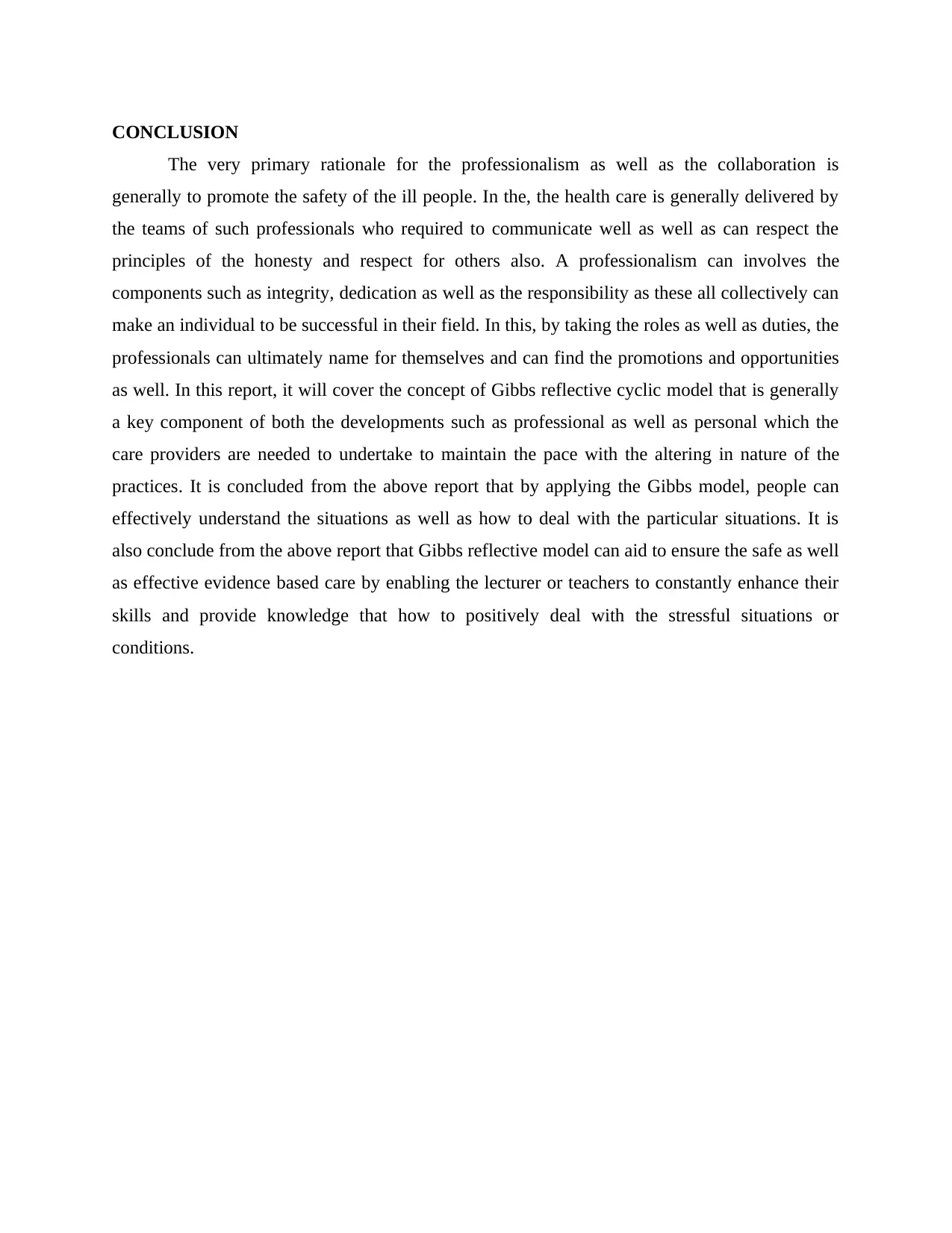
CONCLUSION
The very primary rationale for the professionalism as well as the collaboration is
generally to promote the safety of the ill people. In the, the health care is generally delivered by
the teams of such professionals who required to communicate well as well as can respect the
principles of the honesty and respect for others also. A professionalism can involves the
components such as integrity, dedication as well as the responsibility as these all collectively can
make an individual to be successful in their field. In this, by taking the roles as well as duties, the
professionals can ultimately name for themselves and can find the promotions and opportunities
as well. In this report, it will cover the concept of Gibbs reflective cyclic model that is generally
a key component of both the developments such as professional as well as personal which the
care providers are needed to undertake to maintain the pace with the altering in nature of the
practices. It is concluded from the above report that by applying the Gibbs model, people can
effectively understand the situations as well as how to deal with the particular situations. It is
also conclude from the above report that Gibbs reflective model can aid to ensure the safe as well
as effective evidence based care by enabling the lecturer or teachers to constantly enhance their
skills and provide knowledge that how to positively deal with the stressful situations or
conditions.
The very primary rationale for the professionalism as well as the collaboration is
generally to promote the safety of the ill people. In the, the health care is generally delivered by
the teams of such professionals who required to communicate well as well as can respect the
principles of the honesty and respect for others also. A professionalism can involves the
components such as integrity, dedication as well as the responsibility as these all collectively can
make an individual to be successful in their field. In this, by taking the roles as well as duties, the
professionals can ultimately name for themselves and can find the promotions and opportunities
as well. In this report, it will cover the concept of Gibbs reflective cyclic model that is generally
a key component of both the developments such as professional as well as personal which the
care providers are needed to undertake to maintain the pace with the altering in nature of the
practices. It is concluded from the above report that by applying the Gibbs model, people can
effectively understand the situations as well as how to deal with the particular situations. It is
also conclude from the above report that Gibbs reflective model can aid to ensure the safe as well
as effective evidence based care by enabling the lecturer or teachers to constantly enhance their
skills and provide knowledge that how to positively deal with the stressful situations or
conditions.
⊘ This is a preview!⊘
Do you want full access?
Subscribe today to unlock all pages.

Trusted by 1+ million students worldwide
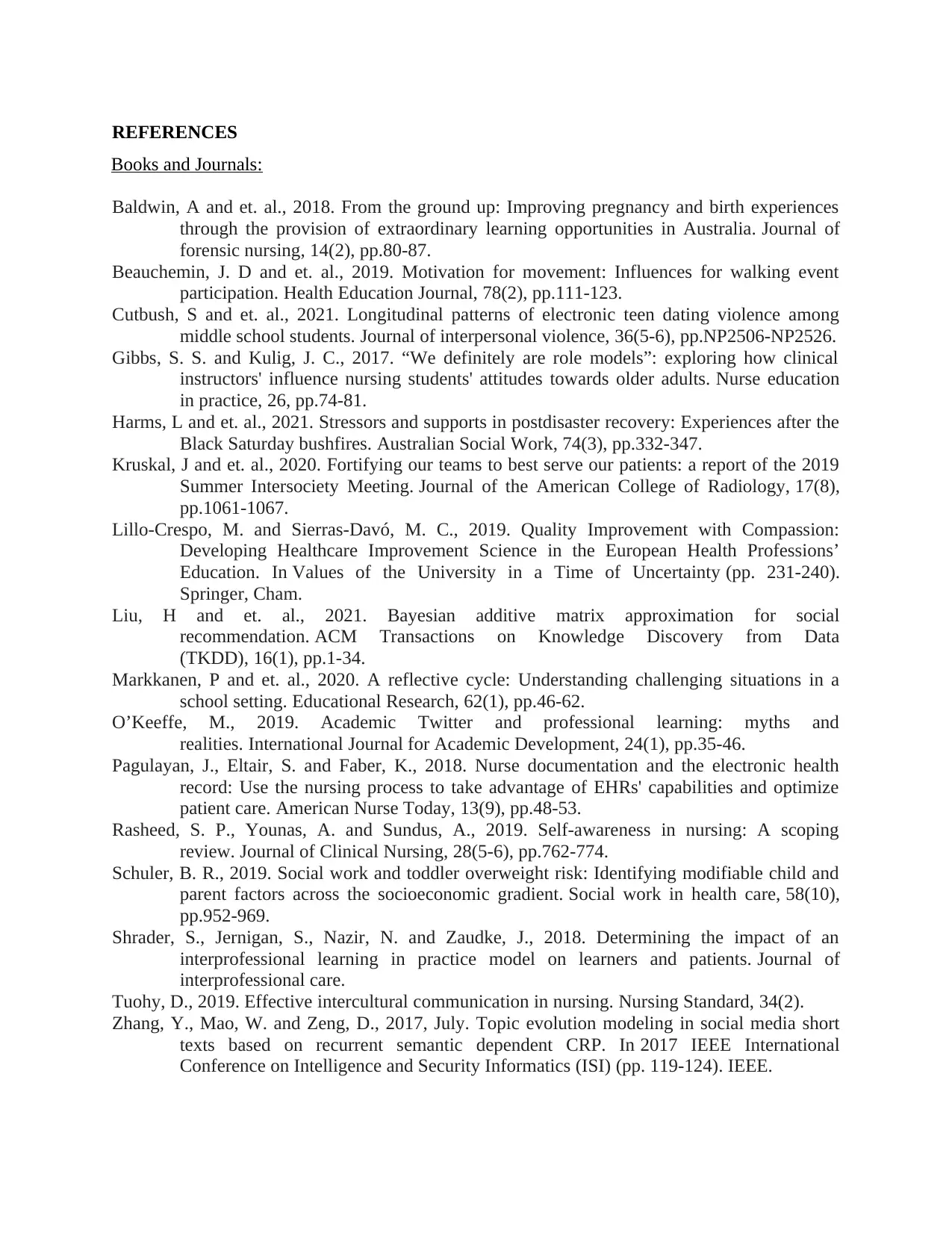
REFERENCES
Books and Journals:
Baldwin, A and et. al., 2018. From the ground up: Improving pregnancy and birth experiences
through the provision of extraordinary learning opportunities in Australia. Journal of
forensic nursing, 14(2), pp.80-87.
Beauchemin, J. D and et. al., 2019. Motivation for movement: Influences for walking event
participation. Health Education Journal, 78(2), pp.111-123.
Cutbush, S and et. al., 2021. Longitudinal patterns of electronic teen dating violence among
middle school students. Journal of interpersonal violence, 36(5-6), pp.NP2506-NP2526.
Gibbs, S. S. and Kulig, J. C., 2017. “We definitely are role models”: exploring how clinical
instructors' influence nursing students' attitudes towards older adults. Nurse education
in practice, 26, pp.74-81.
Harms, L and et. al., 2021. Stressors and supports in postdisaster recovery: Experiences after the
Black Saturday bushfires. Australian Social Work, 74(3), pp.332-347.
Kruskal, J and et. al., 2020. Fortifying our teams to best serve our patients: a report of the 2019
Summer Intersociety Meeting. Journal of the American College of Radiology, 17(8),
pp.1061-1067.
Lillo-Crespo, M. and Sierras-Davó, M. C., 2019. Quality Improvement with Compassion:
Developing Healthcare Improvement Science in the European Health Professions’
Education. In Values of the University in a Time of Uncertainty (pp. 231-240).
Springer, Cham.
Liu, H and et. al., 2021. Bayesian additive matrix approximation for social
recommendation. ACM Transactions on Knowledge Discovery from Data
(TKDD), 16(1), pp.1-34.
Markkanen, P and et. al., 2020. A reflective cycle: Understanding challenging situations in a
school setting. Educational Research, 62(1), pp.46-62.
O’Keeffe, M., 2019. Academic Twitter and professional learning: myths and
realities. International Journal for Academic Development, 24(1), pp.35-46.
Pagulayan, J., Eltair, S. and Faber, K., 2018. Nurse documentation and the electronic health
record: Use the nursing process to take advantage of EHRs' capabilities and optimize
patient care. American Nurse Today, 13(9), pp.48-53.
Rasheed, S. P., Younas, A. and Sundus, A., 2019. Self‐awareness in nursing: A scoping
review. Journal of Clinical Nursing, 28(5-6), pp.762-774.
Schuler, B. R., 2019. Social work and toddler overweight risk: Identifying modifiable child and
parent factors across the socioeconomic gradient. Social work in health care, 58(10),
pp.952-969.
Shrader, S., Jernigan, S., Nazir, N. and Zaudke, J., 2018. Determining the impact of an
interprofessional learning in practice model on learners and patients. Journal of
interprofessional care.
Tuohy, D., 2019. Effective intercultural communication in nursing. Nursing Standard, 34(2).
Zhang, Y., Mao, W. and Zeng, D., 2017, July. Topic evolution modeling in social media short
texts based on recurrent semantic dependent CRP. In 2017 IEEE International
Conference on Intelligence and Security Informatics (ISI) (pp. 119-124). IEEE.
Books and Journals:
Baldwin, A and et. al., 2018. From the ground up: Improving pregnancy and birth experiences
through the provision of extraordinary learning opportunities in Australia. Journal of
forensic nursing, 14(2), pp.80-87.
Beauchemin, J. D and et. al., 2019. Motivation for movement: Influences for walking event
participation. Health Education Journal, 78(2), pp.111-123.
Cutbush, S and et. al., 2021. Longitudinal patterns of electronic teen dating violence among
middle school students. Journal of interpersonal violence, 36(5-6), pp.NP2506-NP2526.
Gibbs, S. S. and Kulig, J. C., 2017. “We definitely are role models”: exploring how clinical
instructors' influence nursing students' attitudes towards older adults. Nurse education
in practice, 26, pp.74-81.
Harms, L and et. al., 2021. Stressors and supports in postdisaster recovery: Experiences after the
Black Saturday bushfires. Australian Social Work, 74(3), pp.332-347.
Kruskal, J and et. al., 2020. Fortifying our teams to best serve our patients: a report of the 2019
Summer Intersociety Meeting. Journal of the American College of Radiology, 17(8),
pp.1061-1067.
Lillo-Crespo, M. and Sierras-Davó, M. C., 2019. Quality Improvement with Compassion:
Developing Healthcare Improvement Science in the European Health Professions’
Education. In Values of the University in a Time of Uncertainty (pp. 231-240).
Springer, Cham.
Liu, H and et. al., 2021. Bayesian additive matrix approximation for social
recommendation. ACM Transactions on Knowledge Discovery from Data
(TKDD), 16(1), pp.1-34.
Markkanen, P and et. al., 2020. A reflective cycle: Understanding challenging situations in a
school setting. Educational Research, 62(1), pp.46-62.
O’Keeffe, M., 2019. Academic Twitter and professional learning: myths and
realities. International Journal for Academic Development, 24(1), pp.35-46.
Pagulayan, J., Eltair, S. and Faber, K., 2018. Nurse documentation and the electronic health
record: Use the nursing process to take advantage of EHRs' capabilities and optimize
patient care. American Nurse Today, 13(9), pp.48-53.
Rasheed, S. P., Younas, A. and Sundus, A., 2019. Self‐awareness in nursing: A scoping
review. Journal of Clinical Nursing, 28(5-6), pp.762-774.
Schuler, B. R., 2019. Social work and toddler overweight risk: Identifying modifiable child and
parent factors across the socioeconomic gradient. Social work in health care, 58(10),
pp.952-969.
Shrader, S., Jernigan, S., Nazir, N. and Zaudke, J., 2018. Determining the impact of an
interprofessional learning in practice model on learners and patients. Journal of
interprofessional care.
Tuohy, D., 2019. Effective intercultural communication in nursing. Nursing Standard, 34(2).
Zhang, Y., Mao, W. and Zeng, D., 2017, July. Topic evolution modeling in social media short
texts based on recurrent semantic dependent CRP. In 2017 IEEE International
Conference on Intelligence and Security Informatics (ISI) (pp. 119-124). IEEE.
Paraphrase This Document
Need a fresh take? Get an instant paraphrase of this document with our AI Paraphraser
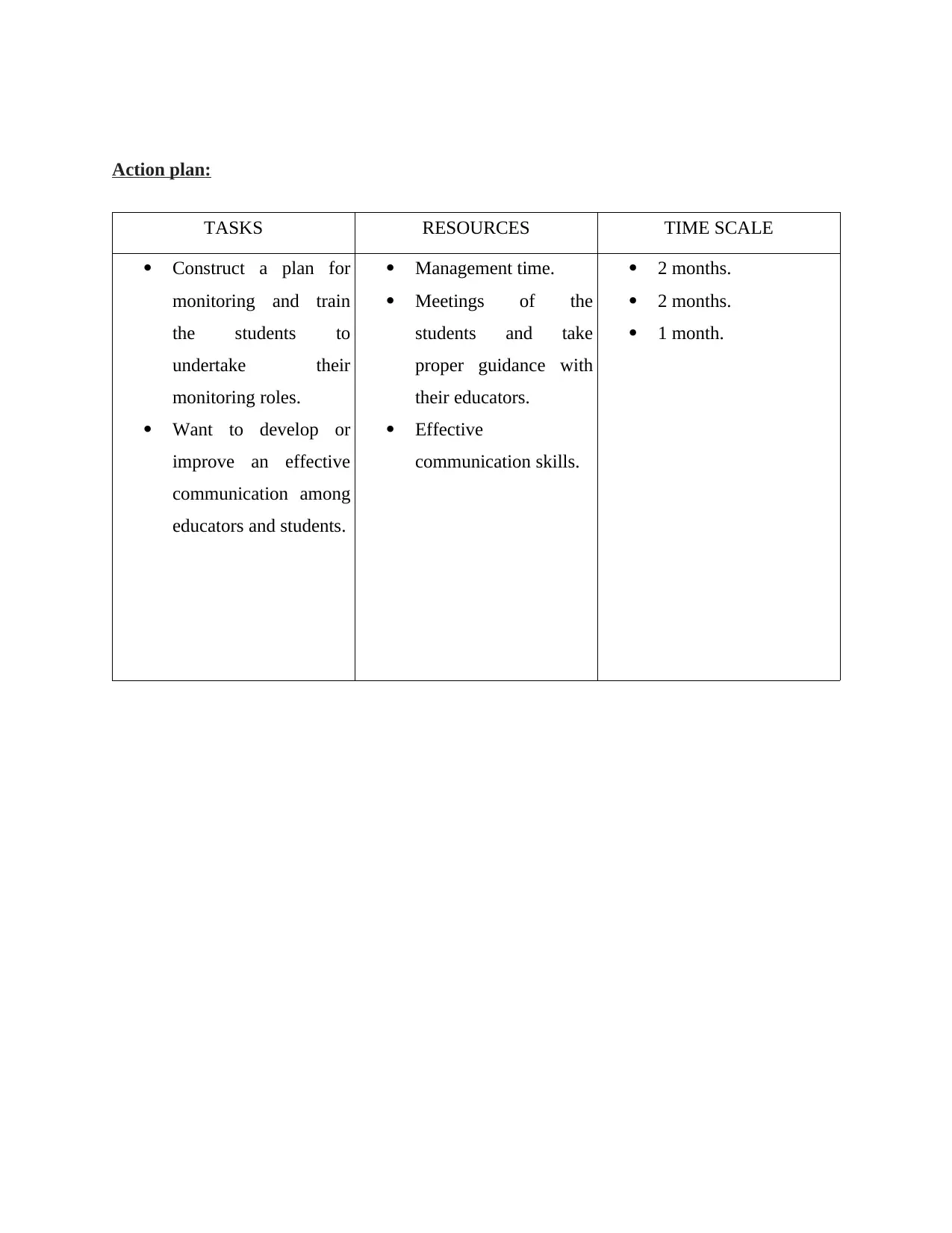
Action plan:
TASKS RESOURCES TIME SCALE
Construct a plan for
monitoring and train
the students to
undertake their
monitoring roles.
Want to develop or
improve an effective
communication among
educators and students.
Management time.
Meetings of the
students and take
proper guidance with
their educators.
Effective
communication skills.
2 months.
2 months.
1 month.
TASKS RESOURCES TIME SCALE
Construct a plan for
monitoring and train
the students to
undertake their
monitoring roles.
Want to develop or
improve an effective
communication among
educators and students.
Management time.
Meetings of the
students and take
proper guidance with
their educators.
Effective
communication skills.
2 months.
2 months.
1 month.
1 out of 11
Related Documents
Your All-in-One AI-Powered Toolkit for Academic Success.
+13062052269
info@desklib.com
Available 24*7 on WhatsApp / Email
![[object Object]](/_next/static/media/star-bottom.7253800d.svg)
Unlock your academic potential
Copyright © 2020–2026 A2Z Services. All Rights Reserved. Developed and managed by ZUCOL.



